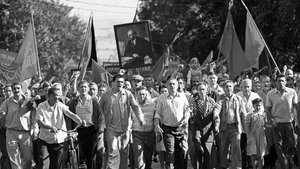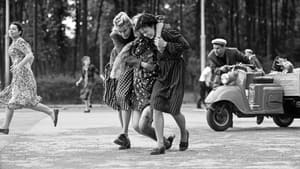Videos Playlist
Similar Collection
Images
-
badelf
This is an amazing story, incredibly well-told. The script, the visual story-telling and the acting are all first class. It's well worth watching to understand how we, as humans, get sucked in by the rhetoric of a "government". This aspect of our collective history has not changed since Hitler was alive. It's current in China, and even was operating in the USA when Trump was present. It's not hard to draw these parallels. I loved the decision to go B&W! - it makes it all that much more palatable for us to digest the relevance to our own time.
-
CinemaSerf
It's the USSR in the early 1960s and though the Soviet Union is sending messages to the world of it's success, it's citizens are frequently on the verge of starvation. Even the most ardent of Communist party supporters find it hard when the government puts up the prices, but the wages remain static. This proves the final straw for some factory workers in a small town, who dare to go on strike. Not only that, but they invade the local party HQ where they are disgusted to find the occupants have a supply of cognac and Hungarian sausage. This is all quite traumatising for the loyalist "Lyudmila" (Yulia Vysotskaya) who is a died in the wool supporter but who is genuinely quite abhorred by the military's reaction - a feeling only augmented when she discovers that her young daughter has gone missing. Was she caught up in the silent aftermath? Unlike many, she still has some freedom of movement in this now locked-down town, and so we follow her increasingly desperate search for the girl and encounter the might of a state that brooks no resistance to it's authority. It's a pretty potent indictment of the tyrannical state that uses indoctrination to thrive, and of one that has no compunction when it comes to killing to retain and demonstrate control. It's not necessarily anti-Communist in itself, more anti-authoritarian. It encourages "Lyudmila" (and us) to consider the old adage about absolute power, of fear and retribution. Using a documentary style of photography, Andrey Konchalovskiy clearly has his own views on the Soviet state to impart here, but that message is easily transferred to dictatorships the world over, and with a strong and progressively emotional effort from Vyotskaya as a woman whose life is now upside down, whose values have been challenged and whose priorities have been well and truly shaken, is quite powerfully presented. Blood won't clean easily from asphalt - so you need to re-tarmac the street!










